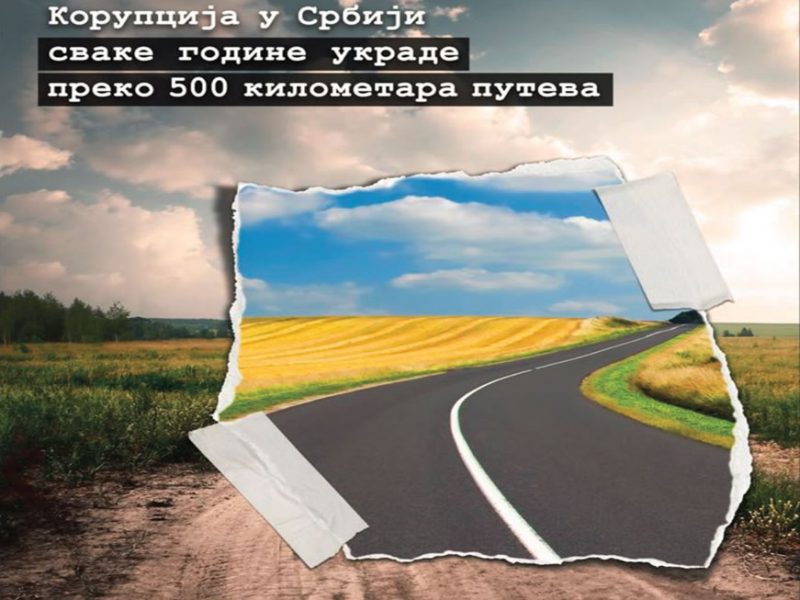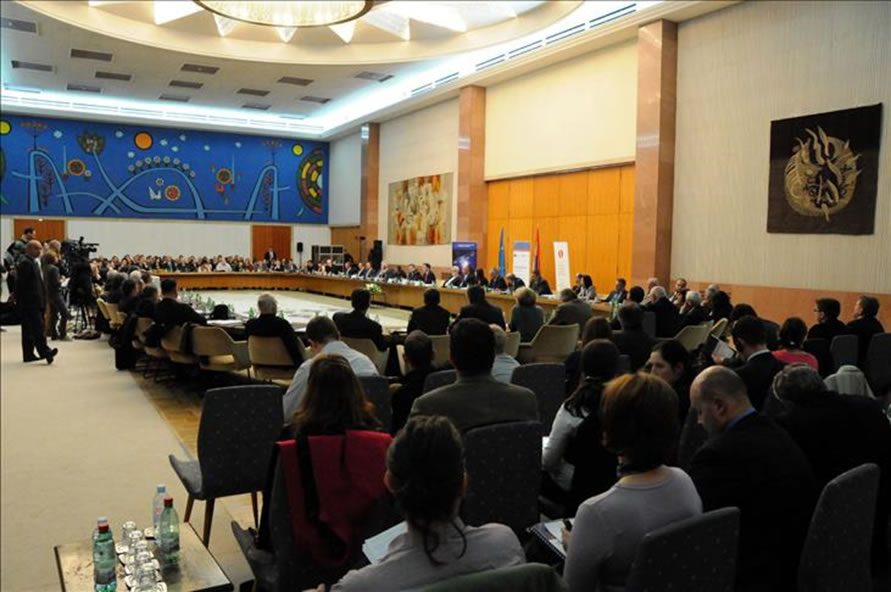High level Anti-Corruption Forum within the project “Support to the work of the Anti-Corruption Agency” and Anti-corruption Awareness Raising Campaign

November, 2012, Belgrade, Serbia
Corruption and anti-corruption policy are a long-term political problem in Serbia. Fight against corruption at the national and local levels is one of the biggest challenges on the road to the European Union. That was the main message of the Anti-Corruption Forum held in Belgrade on November 21, 2012 at the Palace of Serbia, organized by the Anti-Corruption Agency of Serbia with the support of the Delegation of the European Union to Serbia and Serbian government.

The first Serbian Anti-Corruption Forum, part of the project “Supporting the Work of the Anti-Corruption Agency” – EU IPA 2008, was attended by more than 200 prominent representatives of the Serbian public administration, companies, non-governmental organizations and media, as well as experts in the field of corruption prevention from Serbia and abroad. Serbian Prime Minister and Internal affair Minister Ivica Dačić said in their address that the fight against corruption is one of his government’s priorities and that corruption undermines the rule of law, democracy, human rights and economic development.
“The weakness of any link of the institution in the system involved in the fight against corruption is reflecting in the stability of the whole system. An important role can be played by each individual if confidence in the integrity of state institutions is developed,” said Dačić, adding that Serbia did not move far in building the system to combat this social disease. He also recalled that Serbia had enacted a number of anti-corruption laws and proved that most corruption cases happened in public procurement for public companies, in cases of appropriation of certain statuses such as disability pension, start-up loans, as well as in the work of judicial authorities, cases of abuse of office in state and local government bodies, as well that corruption is noticeable in the work of educational and health care institutions and in the police. Dačić expressed his expectation toward all entities to fully contribute to the implementation of the national and action plan to combat corruption.
The Head of the European Union Mission in Serbia, Vincent Degert, said that the media has a special role to play in the fight against corruption and that regardless of the Government’s views, it is necessary to build a public view that no one is above the law. Degert said that Serbia had not made progress in the fight against corruption, and suggested that a new strategy be drafted, whose implementation would be constantly monitored. “Serbia’s position on the anti-corruption performance scale is low. We have to consider the fact that Serbia has stagnated in this regard and I would say that it has been in decline for the last year. That is an alarm bell,” Degert said, recalling that even EU member states were invited to step up their fight against corruption. He announced that as early as December 2012, prosecutors and judges in Serbia would attend a special training in the topics of fight against corruption.
Serbian Minister of Justice and State Administration Nikola Selaković said that awareness of the fight against corruption and the harmfulness of corrupt behaviour was needed. “The media ranked fourth in terms of corruption in European statistics. In the first place there are political parties, in the second the police, and in the third, the judiciary,” Selaković said, pointing out that main problem is that citizens perceive but do not report corruption because of fear or rather their indifference and disinterest since they perceive corruption as a common occurrence. “Corruption is reported only if you trust the state and the local community, if you stand up and point your finger,” Serbia’s justice minister said. He announced a whistle blower protection bill with an aim to protect any person reporting corruption in the community or in the workplace.

The Chairman of the Board of the Anti-Corruption Agency, prof. Zoran Stojiljković presented the results of the Agency’s research conducted in cooperation with CeSID in spring 2012, which shows that the citizens of Serbia have a good understanding of the problem and causes of corruption. Citizens believe that the work of the state administration is one of the causes of corruption and more than 70% of them do not believe that state institutions are capable of protecting the public interest. Almost 90% of citizens believe that every institution must be responsible for preventing corruption “in their own house.” Yet, no institution can overcome this problem alone, as it is supported by the fact that more than 70% of citizens believe that better inter-institutional cooperation and coordination would make results. More than 70% of citizens believe that the fight against corruption would produce better results if both repressive and preventive methods were used.
Also, more than 80% of citizens believe that corruption also consists of the use of public resources in the personal and political interests of the tycoon, just like donating of officials or doing favour for something that is considered to be a regular job of an official. Almost 80% of citizens recognize nepotism, and more than 70% of citizens believe that corruption is an influence of different interest groups on the work of institutions. As professor Stojiljković pointed out, complicated and non-transparent procedures in the work of institutions, lengthy procedures and large discretionary powers, insufficient control and accountability in the work of civil servants, especially executives are considered the cause of corruption by the most citizens.
Following the plenary session of Anti-Corruption Forum, three parallel panels dedicated to combating corruption in public administration, in public and private companies, and in the media and civil society organizations were held. Panel participants discussed the ways how different sectors can contribute to the successful fight against corruption as well as of the importance of a personal example to counteract corrupt behaviour. The objectives of the Anti-Corruption Forum were to share best anti-corruption experiences and to improve the cooperation and coordination of the Anti-Corruption Agency with representatives of the public administration, business sector, civil society organizations and the media in Serbia.
Anti-Corruption Awareness Raising Campaign
“Corruption Steals the Future”
As a part of the two-year EU funded project “Supporting the Work of the Anti-Corruption Agency” IPA 2008, an integrated Anti-Corruption Awareness Raising Campaign has been designed and implemented to raise public awareness on the importance of preventing and fighting corruption. The national Anti-Corruption Campaign “Corruption Steals the Future” was awarded with silver by the Association of Market Communications of Serbia (UEPS). The communication campaign was conducted by Ksenija Renko, a senior communications expert from Croatia and Jasmina Krstic, communications expert from Serbia. The creative concept was conceived by the drafting agencies of DraftFCB + Afirma, and the video was directed by Srđan Golubović, author of the films Absolute One hundred, Trap and Circles. Awareness Raising Campaign was launched on March 30, 2013 and included integrated communication through various channels: television, radio, internet, leaflets, posters, brochures, social media, special events and PR activities. The micro-site of the campaign has gone live and today the address www.prijavikorupciju.rs is very active – citizens use it to report corruption cases in their environment.



